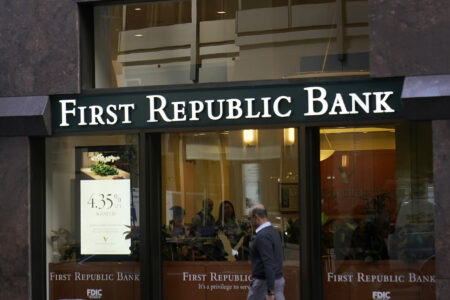US Treasury disingenuously denies there is a banking calamity.
Written by Ahmed Adel, Cairo-based geopolitics and political economy researcher
California-based First Republic Bank was seized by US financial authorities on May 1 and sold to JPMorgan Chase in a desperate effort to alleviate the two-month banking crisis that has gripped the US. First Republic became the second-largest bank by assets to collapse in US history after it announced a loss of more than $100 billion in deposits in the first quarter and failed to produce a satisfactory rescue plan. The federal government believes a total of $13 billion will have to be forked out to cover the bank’s losses.
When First Republic stock prices nosedived, US authorities solicited bids from potential buyers and then took possession. As part of the deal, the Federal Deposit Insurance Corporation (FDIC), an agency in charge of guaranteeing bank deposits, was appointed as the receiver of First Republic. The FDIC then immediately sold First Republic to the largest bank in the US, JPMorgan Chase, which will recover all the deposits and “almost” all the assets of the failed bank.
“Our government invited us and others to step up, and we did,” Jamie Dimon, JPMorgan’s CEO, said in a statement after the deal was announced.
“[The transaction] modestly benefits our company overall,” JPMorgan said in a news release.
It is no surprise that JPMorgan shares went up 4.3% in pre-market trading following its takeover.
“Hopefully this will help stabilise everything,” Dimon said on a conference call with reporters before the US stock market opened.
It is recalled that the agency’s takeover and sale of First Republic comes only two months after the liquidation of Silvergate Bank — a cryptocurrency-focused bank — and the collapse of Silicon Valley Bank (SVB). This was then followed by Signature Bank, which closed only a few days after SVB.
The collapses not only affected the banking sector in the US because it was also felt across the Atlantic. Swiss banking giant Credit Suisse became a victim of the US banking crisis and was forced by regulators to merge with its rival, UBS.
It is recalled that US financial authorities in March reached a deal with 11 major banks to give a $30 billion handout to First Republic. This was obviously not enough to reassure investors as First Republic plummeted in value to only $654 million from more than $20 billion at the start of 2023, and $40 billion at its peak in November 2021.
Although First Republic seemingly appeared to be strong because of its wealthy clientele who deposited large sums, the banking defaults across the US scared customers. Because most First Republic loans were fixed-rate mortgages, a financial meltdown was guaranteed when the fixed-rate mortgages lost value due to soaring interest rates
First Republic is the second-largest bank in US history to collapse when not including investment banks, such as Lehman Brothers. With assets standing at $233 billion just days before the takeover, First Republic still only comes in second place due to Washington Mutual’s collapse during the 2008 financial crisis. Just like First Republic, Washington Mutual was ultimately acquired by JPMorgan.
Before the JPMorgan takeover, Nicolas Veron, an economist at the Peterson Institute for International Economics, said: “First Republic was identified as a problem bank as early as mid-March and the announcement of its closure is not a new reason to worry. If another bank proved to be fragile, that would be another problem.”
In trying to alleviate concerns despite the evident banking crisis, the US Treasury said: “The banking system remains sound and resilient, and Americans should feel confident in the safety of their deposits and the ability of the banking system to fulfil its essential function of providing credit to businesses and families.”
The crisis also comes as the Federal Reserve struggles to counter inflation through massive interest rate hikes, which they will expectedly do once again in May.
The latest bank collapse was followed by Treasury Secretary Janet Yellen warning that the US may not be able to meet its debt obligations “as early as June 1” if Congress does not raise the debt limit.
“After reviewing recent federal tax receipts, our best estimate is that we will be unable to continue to satisfy all of the government’s obligations by early June, and potentially as early as June 1, if Congress does not raise or suspend the debt limit before that time,” Yellen wrote in a letter to Congress on May 1.
The letter also highlighted that “federal receipts and outlays are inherently variable, and the actual date that Treasury exhausts extraordinary measures could be a number of weeks as more information becomes available.”
“Given the current projections, it is imperative that Congress act as soon as possible to increase or suspend the debt limit in a way that provides longer-term certainty that the government will continue to make its payment,” Yellen urged.
This once again demonstrates that for all the brave talk by the Treasury, there is immense stress on the US financial and banking system, something that is only worsening as Washington continues to pump billions of dollars to the Kiev regime, an action that is proving increasingly unpopular in the country as well as Europe.





FRB is a casualty of the Feds battle against inflation while trying an failing to hold artificially low interest rates. The US government seems to be loosing the ability to create money out of thin air.
It’s true to say that the US is literally drowning in debt, and the reality is that the citizens of Haiti are in a better financial position than the citizens of the USA, LOL.
Fantastická správa. Verím, že sa im to teraz zosype ako domino!!! Už nebudú mať ako sanovať tieto dlhy. Už im ani vyciciavanie EU nepomôže.